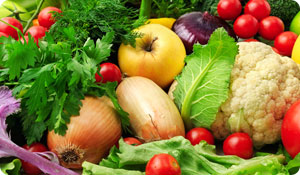
Foods that are filling are said to have a high satiety value. Satiety is the feeling of fullness at the end of a meal. It's the feeling that tells you that you aren't hungry anymore. Feeling full also helps control how much you eat at each meal and throughout the day.
So, are some foods more filling than others? Yes. In her book, Volumetrics, Barbara Rolls, PhD, states that foods with a high water content have a big impact on satiety. Water dilutes the calories in a given amount of food.
Foods naturally rich in water include fruits and vegetables, low-fat milk, and cooked grains. Other foods that increase satiety include lean meats, fish, poultry and beans. Some water-rich dishes include soups, stews, casseroles, pasta with vegetables and fruit-based desserts.
Fiber also increases satiety by providing bulk without a lot of calories. Foods naturally high in fiber include beans, fruits, vegetables and whole grains.
Also, protein foods have been shown to be more filling than carbohydrates or fats.
Some top filling foods to include in your menus:
- Beans (soy, lentils, kidney, black, garbanzo, pinto, etc.)
- Protein foods such as fish, poultry without skin and lean meats
- Low fat or skim milk or soy milk or low-fat, low-sugar yogurt
- Eggs or egg whites
- Oatmeal
- Whole grain cereals and breads
- Fruits
- Vegetables
- Salads (go easy on dressings)
- Soups (broth-based)
Some nutrition professionals have recommended eating foods from at least 2 food groups at a meal or snack. For example:
- tuna salad on whole wheat bread
- cereal and skim milk
- fruit and yogurt
- vegetable soup and whole grain crackers
- salad with lettuce, fresh veggies and kidney or garbanzo beans
Eating filling foods helps to curb hunger and control calorie intake. Eating mindfully plays a key role in curbing hunger and controlling calorie intake also. Mindful eating involves paying attention to the foods you're eating instead of eating without truly focusing on your food. Eating while driving or working or watching tv can lead to decreased enjoyment of your food and overeating. Some people don't pay enough attention to really know when they're full or truly hungry either. Instead, many eat until they are feeling stuffed or even sick. Eating this much indicates a person has overeaten.





